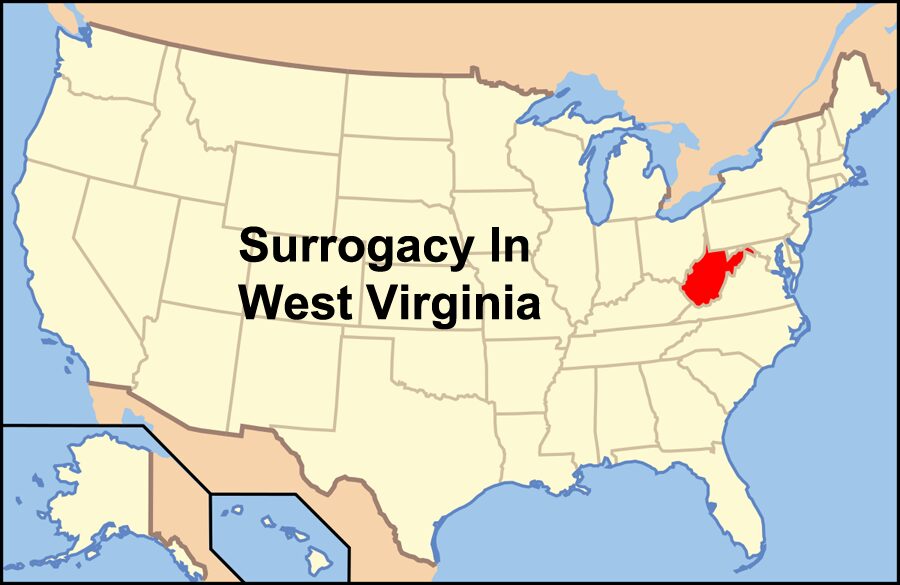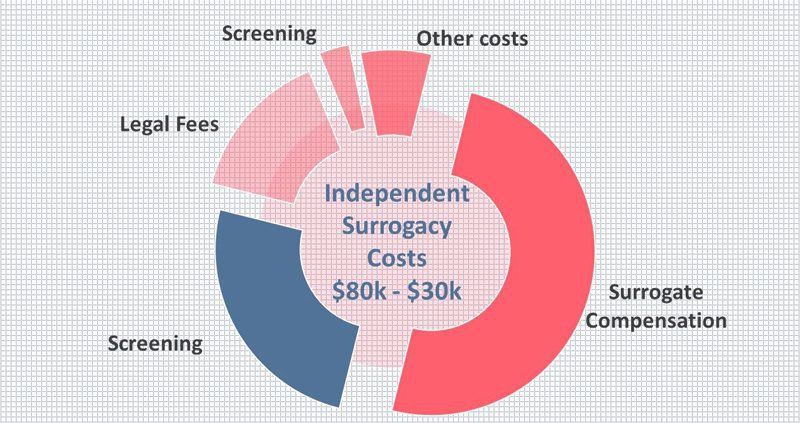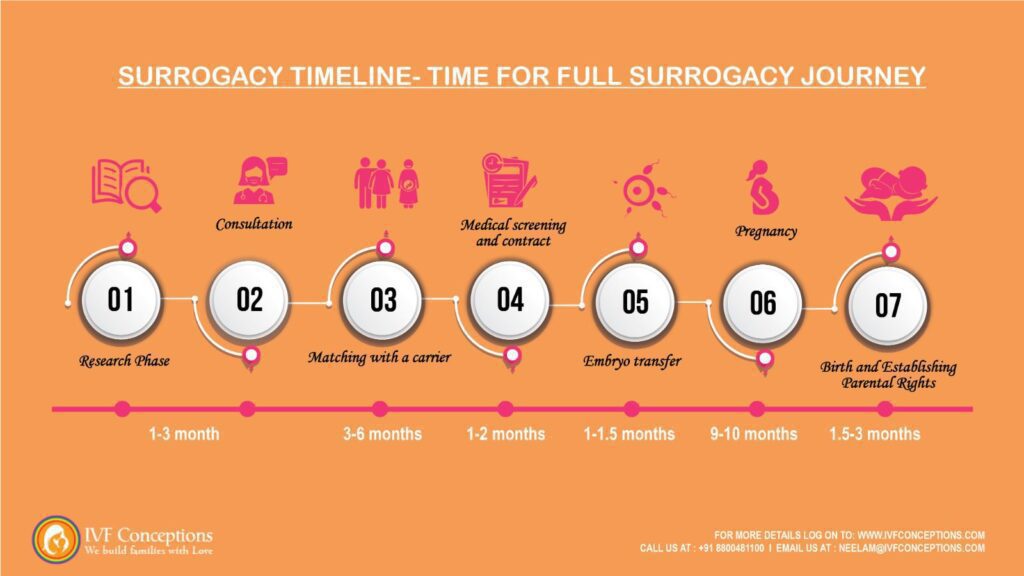Gestational Surrogacy In West Virginia: A Comprehensive Guide

Surrogacy in West Virginia has been increasingly popular in recent years, providing aspiring parents who are unable to conceive naturally with a glimpse of hope. In the beautiful state of West Virginia, surrogacy has become a popular option that gives many single people and couples a chance to become parents.
This essay dives into the world of surrogacy in West Virginia, examining the legal consequences, the emotional journey of all individuals involved, and the complexities of this procedure.
Gestational surrogacy, in which the surrogate mother is not biologically related to the child she is carrying, is the method used to facilitate surrogacy in West Virginia. For intended parents who are experiencing infertility, have health issues, or are same-sex couples hoping for a biological child, this technique provides a glimmer of hope.
West Virginia does not have any laws that forbid surrogacy; hence, the practice is allowed there. West Virginia’s lone surrogacy statute permits commercial surrogacy. This implies that the state will pay surrogates a base salary for their work.
Get in touch for FREE SURROGACY CONSULTING:
Mobile: +91-8800481100 ( WhatsApp, Line, Viber)
Email: neelam@ivfconceptions.com
You may get started with the process of becoming a surrogate in West Virginia by getting in touch with us right now. But keep reading to learn more about how surrogacy operates and how to become a surrogate in West Virginia.
Additional guides for surrogacy in the USA:
Surrogacy In the USA is Made Easy and Affordable.
How Much do Surrogacy Agencies Charge in the USA?
How Much Does Surrogacy Cost in USA ( 2023)?
Why USA Couples Should Do Surrogacy In Georgia, Europe?
Surrogacy Financing Options For Intended Parents
Why Surrogacy Costs So High And How To Manage It?
Overview Of Gestational Surrogacy In West Virginia
Insofar as there are no regulations in West Virginia that forbid surrogacy, the practice is permissible for both intended parents and surrogates. The state’s lone surrogacy statute governs commercial surrogacy and declares it lawful.
Compensated surrogacy is lawful in West Virginia because a statute allows fees and costs to be paid to a surrogate.
State surrogacy regulations in West Virginia do not forbid traditional surrogacy.
West Virginia does not have any legislation about surrogacy; hence, the process of drafting a surrogacy contract is managed by qualified surrogacy attorneys in this state. As a result, drafting a surrogacy agreement in West Virginia will be comparable to drafting one in any other state where there are no laws governing surrogacy.
It may be necessary for single intended parents to complete adoption to establish their parental rights if they are unable to obtain a pre-birth parentage order in a West Virginia surrogacy; however, this can only be decided by an accomplished surrogacy lawyer who is familiar with the state’s procedures.
West Virginia does not allow for the second parent’s adoption. If required, only married intended parents may establish their parental rights through an adoption after delivery.
To establish their parental rights through surrogacy, intended parents in West Virginia must either be married beforehand or relocate to another state to adopt a second child.
Since there are no second-parent adoptions available, unmarried intended parents who use donor gametes are unlikely to be able to acquire a parentage order for both intended parents and will have a more difficult time proving their parental rights.
Surrogacy Laws In West Virginia
 West Virginia surrogacy law can be complicated, but we’ll help you understand it here so you can go through the procedure with assurance. To make sure that the surrogacy procedure is compliant with the law, a surrogacy attorney is essential.
West Virginia surrogacy law can be complicated, but we’ll help you understand it here so you can go through the procedure with assurance. To make sure that the surrogacy procedure is compliant with the law, a surrogacy attorney is essential.
They assist in drafting surrogacy contracts that comply with West Virginia surrogacy legislation and offer both parties invaluable legal counsel. To successfully manage the complexity of West Virginia’s surrogacy law, it is imperative to work with an experienced surrogacy lawyer.
Parentage Orders
In West Virginia, pre-birth orders are lawful. This is a crucial feature of West Virginia’s surrogacy laws, enabling intended parents to establish their parental rights through a pre-birth order issued by the court before the baby is born.
This streamlines the surrogacy process by doing away with the requirement for post-birth legal processes to transfer parenthood. It is crucial to work with a skilled West Virginia surrogacy attorney to make sure the pre-birth order is properly written and carried out, giving the intended parents and surrogates peace of mind before the delivery of the child.
Married couples in West Virginia who have surrogated using one or both of their gametes usually receive favorable treatment from the courts. In certain cases, the courts will usually issue a pre-birth parentage order. Married intended parents who use donor embryos and are genetically unrelated to their offspring are likely also eligible for pre-birth parentage orders.
Unmarried couples who wish to become intended parents may or may not receive pre-birth parentage orders from surrogacy courts. If this describes you, please get legal advice from a West Virginia surrogacy lawyer.
Surrogacy Agreements
The legal process of drafting a surrogacy contract is managed by qualified surrogacy attorneys in West Virginia, as there are no state regulations about surrogacy. For this reason, drafting a surrogacy agreement in West Virginia will be comparable to drafting one in any other state where surrogacy legislation is nonexistent.
To safeguard their rights and interests throughout this legal process, the intended parents and their surrogates will require the assistance of two different surrogacy attorneys. The aims and requirements of each party will be addressed in a local document that these lawyers will negotiate; this will include things like:
- Compensation for surrogates and further financial details
- The obligations and rights of every party
- Possible dangers and difficulties for every party, together with what to do if they occur
- Consensus on delicate matters such as selective reduction and termination
- Expectations for contact before, during, and following the surrogacy
- Plans for the surrogate’s delivery at the hospital
- Also more
How Much Does Surrogacy Cost in West Virginia?
Expenses of surrogacy in West Virginia often range from $100,000 to $210,000. Due to differing medical expenditures at the fertility clinic, surrogacy charges, legal fees, and other unforeseen incidentals related to the surrogacy procedure, surrogacy prices can vary greatly. It makes sense that becoming a surrogate is an expensive undertaking given the complexity of the procedure and the extensive range of professional services needed. Surrogacy comes with hefty financial obligations, so you should do your homework and be ready for everything. The costs associated with surrogacy can quickly mount up when you account for surrogate compensation, legal fees, and medical services.
Let’s examine some of the costs associated with West Virginia surrogacy that you should be aware of.
- Agency Fees for Surrogacy
The services offered by surrogacy agencies benefit both the intended parents and the surrogates who bring the child to term. Surrogacy agencies effectively shoulder the stress that the surrogacy process might bring by assisting in the coordination of the entire process.
Professionals with training who offer case management, counseling, and other services are employed by surrogacy agencies. In West Virginia, the typical cost of a surrogacy agency is between $20,000 and $32,000.
- West Virginia Medical Costs of Surrogacy
 The surrogacy process will involve some medical procedures. The medications that the surrogate is probably prescribed will also be included in the surrogacy process’s medical expenses. Medication used in surrogacy aids in uterine wall preparation for implantation, improving the likelihood that an embryo transfer will be successful.
The surrogacy process will involve some medical procedures. The medications that the surrogate is probably prescribed will also be included in the surrogacy process’s medical expenses. Medication used in surrogacy aids in uterine wall preparation for implantation, improving the likelihood that an embryo transfer will be successful.
In West Virginia, the average cost of the medical examination, drugs, and embryo transfer for surrogacy can range from $7,800 to $14,000.
- Antenatal Treatment and Delivery
The surrogate will be assessed, just like in any other pregnancy, to guarantee the safety and health of the unborn child as well as the surrogate who is carrying the child. The costs associated with giving birth can vary based on several factors, including whether or not a C-section is being performed and any additional unanticipated medical requirements that the baby or surrogate may have.
In West Virginia, the average cost of the surrogate’s prenatal care and delivery falls between $12,500 and $29,000.
- West Virginia Surrogacy Attorney Fees
Because they give the surrogacy process the peace of mind that it is being carried out legally, surrogate attorneys are invaluable to the surrogacy process and well worth their cost. If you’re thinking of using surrogacy to grow your family or start a new one, remember that having a lawyer by your side to look out for your interests will help you sleep better at night.
In West Virginia, surrogacy legal services typically cost between $6,900 and $13,000.
- The cost of a surrogate in West Virginia
In exchange for implanting another person’s embryo, carrying the child to term, and then honoring their commitment to deliver the child to the expecting parent or parents, surrogates are paid.
The surrogate’s compensation costs include what is known as a base payment, which in West Virginia typically falls between $36,000 and $50,000.
- West Virginia Incidental Costs of Surrogacy
The additional costs that may arise for things like travel, insurance premiums, and a host of other things are frequently disregarded.
Surrogacy costs should be budgeted for with an additional $2,700 to $5,000.
The total cost of the surrogacy procedure can differ greatly based on each set of circumstances.
Surrogacy in West Virginia For Intended Parents
In West Virginia, intending parents select surrogacy for several reasons, such as:
Infertility: endometriosis, low sperm count, urethral stricture, and pelvic inflammatory disease are a few causes of infertility that can affect an individual or a couple.
Medical reasons: Heart transplants and cancer are two diseases that some women face.
LGBT couples: A lot of same-sex couples can become mothers because of surrogacy.
Ladies who have had multiple miscarriages: Surrogate mothers can let women who would otherwise incur unnecessary medical risks still reap the advantages of parenthood.
In West Virginia, intended parents may choose surrogacy for a variety of reasons, including:
- Not having a uterus
- structural problems with the uterus
- Endometriosis
- advanced mother’s age
- Difficulties in earlier pregnancies
- Delivery-specific problems
- serious health problems
- recurrent miscarriages and IVF failures

Related surrogacy Costs guides:
What is the average surrogacy cost?
How much does surrogacy cost in Ukraine?
How much does surrogacy cost in Georgia?
How much does surrogacy cost in India?
What is the Surrogacy Cost in Colombia?
What is Surrogacy cost in Mexico?
What is surrogacy cost with family members?
Surrogacy Process in the USA
The surrogacy process in West Virginia is a laborious endeavor consisting of several critical stages. The following is a summary of the state surrogacy procedure.
You will go through seven steps in your surrogacy journey. These standard procedures in surrogacy include:
- Assess if surrogacy in West Virginia is the most suitable choice for you and your family.
- To prepare for the surrogacy process, find a surrogacy agency.
- Seek out a surrogate mother who has the qualities you value most.
- Fulfill the legal requirements for surrogacy, consult with a surrogacy attorney, and sign a contract.
- Start the process of using medical surrogacy, like surrogacy medications and embryo transfer.
- Before delivery, enjoy time with the surrogate mother.
- Upon delivery of the baby, receive your legal parentage.
Through the life-changing process of surrogacy in West Virginia, intended parents can experience the blessings of parenthood. Throughout this procedure, IVF Conceptions is committed to giving as much empowerment and fulfillment as we can.

Finding A Surrogate Mother In West Virginia | Becoming a gestational surrogate
Finding a surrogate may not be a simple task. Thus, there are several ways we could go about finding the best candidate for the job. Consider, surrogate requirements in West Virginia.
➔ A Surrogacy agency can assist
You will be guided through the entire procedure by an agency, which includes several legal concerns, help in selecting the ideal surrogate, and drafting a contract.
➔ A family member or acquaintance
An additional sense of security is provided by a willing friend or family member who is willing to act as a surrogate.
➔ A surrogate and an egg donor
A lot of fertility clinics and organizations will help locate a suitable surrogate and an egg donor.
There are currently no rules governing who is eligible to serve as a surrogate mother. However, there are a few areas where experts agree when choosing one.
It is best to select surrogates who:
- have reached the age of 21.
- possess firsthand knowledge of the health dangers associated with pregnancy, labor, and the emotional challenges of bonding with a newborn, having already given birth to at least one healthy child.
- have completed a mental health professional’s psychological evaluation to rule out any problems with abandoning the child after birth
- Sign a contract outlining their obligations during the pregnancy, including providing prenatal care and committing to provide you with the child when it is born.
Conclusion
The state of West Virginia permits gestational surrogacy. Traditional surrogacy, in which the surrogate is genetically linked to the child she is carrying, is prohibited in West Virginia. There is currently no precedent in West Virginia regarding the eligibility of unmarried couples to get a pre-birth order. Strong contracts between gestational carriers and surrogates are advised, as is collaborating with an organization on payment and expenditure reimbursement.
If you’d like to learn more about IVF, Egg Donation, or surrogacy services globally, check out the rest of our website at IVF Conceptions. We offer legally secure and affordable surrogacy consulting services for FREE.
Get in touch for FREE SURROGACY CONSULTING:
Mobile: +91-8800481100 ( WhatsApp, Line, Viber)
Email: neelam@ivfconceptions.com
Our team has over 13 years of experience facilitating surrogacy arrangements, egg donation, and serving as an advocacy resource for infertile couples and LGBTQ individuals seeking to build families. Till now we have helped and supported thousands of the intended parents with their family-building journey, and we can help you as well. Happy to share the references from the past IPs if needed.
Our founder and chief surrogacy consultant, Neelam Chhagani, passionately helps couples struggling with fertility challenges. Since starting our surrogacy consulting agency in 2013, we’ve helped welcome over 500 babies for intended parents nationwide.
Our team includes experts from diverse backgrounds with leading reproductive attorneys, professionally trained top fertility doctors, former surrogacy case managers, experienced and kind surrogate mother and egg donor coordinators, mental health professionals specializing in infertility counseling, and a logistic support team to assist you in your chosen surrogacy country.
Frequently Asked Questions About Surrogacy In West Virginia for surrogates and intended parents
 1. What is surrogacy in West Virginia?
1. What is surrogacy in West Virginia?
Surrogacy in West Virginia refers to the process where a woman – the surrogate – carries a child for another individual or couple – the intended parent. Surrogacy can be either gestational, where the surrogate is not genetically related to the child, or traditional, where the surrogate is genetically related to the child.
2. Is surrogacy legal in West Virginia?
Yes, surrogacy is permitted in West Virginia. The surrogacy law in West Virginia allows individuals to enter into a surrogacy agreement, provided certain legal requirements are met. It’s advisable to seek legal advice if you are considering surrogacy in West Virginia.
3. What is the surrogacy process in West Virginia?
The surrogacy process in West Virginia involves several steps, including finding a suitable surrogate, or donor if needed, and finalizing a surrogacy agreement. The fees and expenses, as well as the rights and responsibilities of all parties, are typically outlined in the agreement.
4. What are the advantages of gestational surrogacy in West Virginia?
Gestational surrogacy is permitted in West Virginia and offers the advantage of the gestational carrier not being genetically related to the child. This means the child’s birth certificate can reflect the intended parents as the legal parents from birth in most cases.
5. Who can become a surrogate in West Virginia?
Any woman who meets the surrogacy law requirements in West Virginia and agrees to become a surrogate can potentially become a surrogate in West Virginia.
FAQs for surrogacy in the USA
Q1. What is the process of surrogacy in the USA for intended parents?
Ans. The surrogacy process in West Virginia for intended parents involves multiple steps, starting with a consultation to discuss your story and questions. Working with an experienced agency in surrogacy guides you through milestones like choosing an agency, finding a surrogate, medical screening, and legal contracts.
Q2. How much does surrogacy in the USA cost?
Ans. The cost of surrogacy in the USA varies depending on the program you choose. The cost of surrogacy starts at $150,000 to $200,000 based on the specific services needed and the compensation of the surrogate mother and egg donor. For low-cost surrogacy, it is advised to consider “independent surrogacy or private surrogacy”, which costs less but requires more time and management.
Q3. What are some affordable surrogacy options?
Ans. Affordable surrogacy options are:
- Opting for independent surrogacy arrangements.
- Using a surrogate mother within the family or friend circle.
- Considering the international surrogacy countries with affordable, low-cost surrogacy programs like Mexico, Colombia, Argentina, Georgia, and Ukraine.
Q4. What are the requirements for becoming a surrogate mother in the USA?
Ans. The requirements for becoming a surrogate mother are:
- To become a surrogate mother, you must meet certain criteria.
- You should have delivered a child of your own and be parenting at least one child.
- Uncomplicated pregnancies and deliveries are necessary, as documented by medical records.
- Age requirements are between 21 and 44 years old.
- The Body Mass Index (BMI) is typically no higher than 33.
- Surrogates should be citizens, legal residents, or legal immigrants of the United States.
- medically and psychologically in sound condition.
Q5. Can you help us find a low-cost surrogate mother?
Ans. Yes, we have been working in the international surrogacy domain for 13 years and have good networks of fertility clinics and surrogacy agencies globally that are trusted to offer world-class services. We have long expertise and experience in the best and most legal international surrogacy countries.
If you’d like to learn more about IVF, Egg Donation, or surrogacy services globally, check out the rest of our website at IVF Conceptions. We offer legally secure and affordable surrogacy consulting services for FREE.
Contact us now for a Free International Surrogacy consultation!
Disclaimer:
All legal information on this website is intended only as a guide and is not a replacement for the opinions of licensed legal professionals/Medical professionals. Some information may have changed since the time of publication. We advise you to consult a licensed attorney/Medical expert with authority in fertility/surrogacy processes.
More Resources:
- American Society for Reproductive Medicine (ASRM): https://www.asrm.org/
- The American Infertility Association (AIA): https://resolve.org/
- Family Equality Council: https://www.familyequality.org/
- National Center for Lesbian Rights (NCLR): https://www.nclrights.org/

 1. What is surrogacy in West Virginia?
1. What is surrogacy in West Virginia?